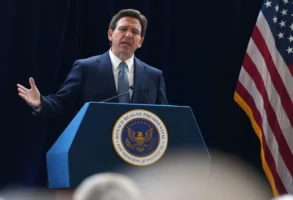Published August 3, 2015
When Newsweek broke the story last week that the College Board had redone its controversial 2014 AP U.S. history (APUSH) framework, the headline blared: “Revised AP U.S. History Standards Will Emphasize American Exceptionalism.” That headline was quickly echoed across the web, with Slate promising an APUSH course “Juiced Up With More ‘American Exceptionalism,’” New York Magazine following suit, and Think Progress decrying the College Board’s supposed “cave” to conservative pressure.
A more accurate headline would have been, “College Board Inserts Meaningless Mention of American Exceptionalism to Shut Conservatives Up: Liberals Go Nuts.”
Early coverage of the renewed APUSH controversy has been shallow. Nearly every story hypes Ben Carson’s (obviously non-literal) claim that students who finish APUSH will be “ready to sign up for ISIS.” Very few stories mention the thoughtful critique of the 2014 APUSH framework signed by over 120 historians and teachers. Virtually none of the coverage so far has explored the revised framework to see if the supposed new emphasis on American exceptionalism actually corresponds to added content. It does not.
While the College Board has thrown in a mention of American exceptionalism to placate critics, the framework itself continues to focus on globalism, culture-mixing, gender identity, migration, environmentalism, and such. America’s sense of principled mission, its unique blending of religious and democratic commitment, its characteristic emphasis on local government, the high cultural esteem in which economic enterprise is held, and America’s distinctive respect for individual liberty, are neither stressed nor contrasted with other countries to highlight the American difference.
I’m going to fill out this point in a moment, but first I want to share a response to the revised APUSH framework I received from one of the signatories of the scholars’ statement protesting the 2014 framework.
Larry Schweikart, a professor of history at the University of Dayton, is the author, with Michael Allen, of A Patriot’s History of the United States (and more recently, a two-volume history of the modern world). A Patriot’s History of the United States is by no means a simplistic “my country right or wrong” tract. It is instead a thoughtful history, acknowledging American flaws, yet written to counter what Schweikart and Allen believe to be the unbalanced negativism of most U.S. history textbooks. (Here are reviews from NR and The Wall Street Journal.) Schweikart sent me an extended critique of the just-released APUSH revisions (which he calls “non-revisons”), and summed up his take in the following two paragraphs:
“The main gist of [the scholars’ statement of protest against the 2014 APUSH framework] was that there was no recognition of American Exceptionalism in the original exam, and then, at a more micro level, hundreds of specific concerns about the lack of economic, military, technological history and traditional biography. As the Who used to sing, “Meet the new boss, same as the old boss.” To appreciate and convey American Exceptionalism, it would help to understand what it is. Michael Allen, then Dave Dougherty and I undertook this in our Patriot’s History of the United States and both volumes of Patriot’s History of the Modern World, to wit, American Exceptionalism rests on four pillars: 1) a Christian, mostly Protestant religious heritage; 2) a heritage of common law; 3) a free market; and 4) private property with titles and deeds. While #3 did not come along arguably until the nation was well-founded, the other three were at work in American colonial history as nowhere else in the world, not even England.”
“There is no indication that the AP group understands—much less endorses—these pillars. The new iteration has some tip of the hat to a free economy, yet it (like everything else here) is entirely focused on “forces” and “trends” while completely ignoring the role of individual entrepreneurs and inventors. It only gets worse when the AP group gets to military history, where apparently wars “are fought” without soldiers, battles, heroes, or generals. There is not a single military leader, not a single Civil War or WWII battle mentioned (save D-Day). As I frequently tell classes, the battle of Antietam did more to shape American history than all the episodes of “I Love Lucy” put together. Yet the sound from AP? Crickets.”
With the minor proviso that the revised framework does give a quick nod to George Washington as a military leader, Schweikart is on point here.
Despite the addition of a theme on American national identity (where the College Board inserts a passing reference to American exceptionalism), there is little-to-no significant new content to bear out this theme. As before, the framework emphasizes culture mixing, migration, and global perspectives, rather than the distinctive features of American identity.
The 2014 APUSH framework, for example, was notorious for repeatedly contrasting the mixed racial unions of the Spanish colonies with the “rigid racial hierarchy” of the English colonies. That controversial cultural comparison is gone now, although a de-sexualized reference to Spanish colonial culture-mixing remains. Yet the more traditional and significant comparison between the democratic, localist, and individualist traditions of the British colonies, on the one hand, and Spanish colonial authoritarianism, on the other, is omitted.
As Schweikart points out, the revised framework neglects the influence of English common law, and the ways in which common law, with its peculiar accommodation to individual initiative and local variation, influenced the American character. I’ve already shown how reluctant the College Board is to highlight the overwhelming influence of European culture on the colonial experience. The same is true of early America’s distinctively British heritage.
The traditional trinity for American students was Western Civilization, English history, and American history. Yet the APUSH framework remains reluctant to acknowledge the distinctive character, much less the achievements, of either Western, British, or American culture. A contrived theme on American national identity has been added as a way of placating critics. But in actual content, the framework remains focused on globalism, culture-mixing, and migration.
And as Schweikart points out, the concerns voiced in the scholars’ statement about the demotion of military and diplomatic history continue to go unaddressed. The focus remains on globalism, gender, migration, environmentalism, and various group identities. As far as I can tell, the framework doesn’t even mention the War of 1812, let alone any of its battles. That doesn’t mean students will never hear about the War of 1812, but it does indicate the College Board’s priorities. Religion is not entirely absent from the framework, but it certainly doesn’t get the constant emphasis that fashionable topics like migration and group identity receive.
The most significant changes to the APUSH framework are the removal of controversial phrases, along with a general paring down of the content. The College Board is obviously straining to avoid controversy. As a result, the framework is now even thinner and more fragmentary than before. The College Board has kept the overall bias of the controversial 2014 edition, and simply removed the loudest proclamations of what that bias was.
In a vacuum, this paring back of content might make for a bit more teacher flexibility. Unfortunately, textbooks for AP U.S. history already run the gamut from liberal Democratic to downright leftist. And now that the textbooks have all been conformed to the controversial 2014 framework, they’re even more left-leaning than they already were. So what will change as a result of the new framework? Essentially, nothing.
All that’s really happened is the excision of the most controversial language. The basic approach is still the same. So there really is virtually nothing for the textbooks to revise.
In short, the changes to the College Board’s APUSH framework are largely cosmetic. As I’ve been saying for some time, the only way to restore meaningful choice to AP testing is to create a competitive alternative to the College Board. Let’s have some of the scholars who signed the statement of protest against the College Board’s APUSH framework advising a company that takes a truly different approach to U.S. history. Then let’s do the same for other AP topics like European history, U.S. Government and Politics, and World History. At that point, folks who can barely stand to hear the phrase “American exceptionalism” would truly have something to scream about—while the rest of us would have reason to smile.
Stanley Kurtz is a senior fellow at the Ethics and Public Policy Center.





